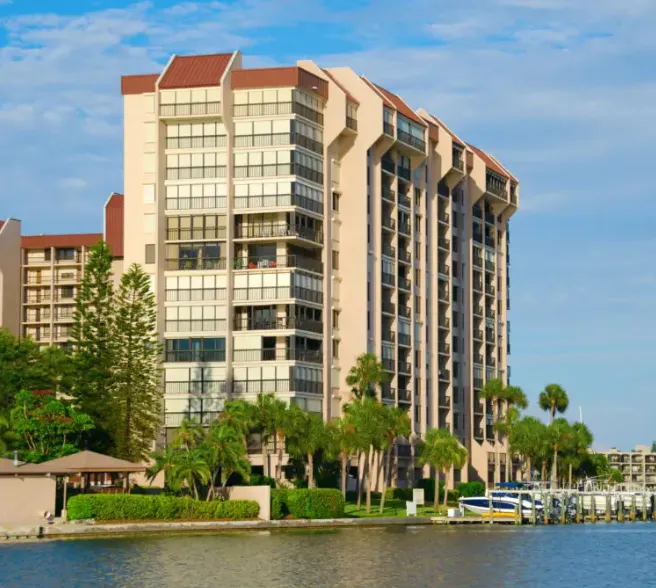Owning a condo in Florida has its perks—sunshine, beautiful views, and a lifestyle that many dream about. But while the location and lifestyle are wonderful, protecting your home and belongings with the right condo insurance is just as important. Without it, you could be left facing significant expenses if disaster strikes.
Understanding the Master Policy
Your first step should be reviewing your condo association’s master policy. This policy typically covers the structure of the building itself—think walls, roof, and shared spaces like elevators, gyms, or pools. Most associations carry what’s called a “bare walls” policy, meaning that anything inside your individual unit, from flooring to appliances, is your responsibility. Less commonly, some associations have an “all-in” policy, which extends coverage to certain fixtures inside units, though this type often comes at a higher cost.
No matter what the master policy includes, it won’t protect your personal belongings or provide you with coverage for many unit-specific needs. That’s where your own condo insurance comes in.
What Condo Insurance Covers
Condominium insurance, also known as an HO-6 policy, is designed to fill the gaps left by your association’s coverage. Key protections often include:
- Dwelling coverage: For interior elements such as cabinets, flooring, paint, or wallpaper.
- Personal property: Protects items like furniture, clothing, electronics, jewelry, and artwork.
- Loss of use: Helps cover temporary living expenses if your unit becomes uninhabitable after a covered loss.
- Personal liability and medical payments: Covers legal or medical expenses if someone is injured in your condo or if their property is damaged while visiting.
- Animal liability: May cover medical and legal costs if your pet injures someone, though certain breeds may be excluded.
- Flood insurance: Not part of standard coverage but essential in Florida due to frequent storms and rising water risks.
- Umbrella coverage: Extra protection for valuable assets like high-end jewelry or unique art.
- Identity theft protection: Provides assistance and reimbursement if you fall victim to identity fraud.
Most policies will also help cover common risks like fire, theft, vandalism, hurricane damage, and certain types of water damage.
Determining How Much Coverage You Need
The amount of coverage depends largely on the value of what you own. Start by estimating the cost of replacing your belongings at today’s prices. In many cases, coverage for personal property and additional living expenses will be tied to the level of dwelling coverage you choose. For example, you might be able to set personal property coverage at a percentage of your dwelling limit.
Flooding Risks for Condo Owners
It’s easy to assume that if you live above ground level, flood insurance isn’t necessary. In Florida, that assumption can be costly. Flooding caused by heavy rainfall, storm surges, or drainage issues can affect the building’s infrastructure and force residents out, even if your unit itself isn’t damaged.
Standard loss-of-use coverage only applies to perils already included in your policy, so without flood insurance, you may not be reimbursed for relocation expenses in these scenarios. Additionally, your condo association could pass along some flood-related repair costs to unit owners if the building’s insurance is insufficient. Having your own flood coverage helps protect you from these unexpected assessments.
Factors That Influence Cost
Condo insurance in Florida is generally less expensive than insuring a single-family home, but your premium will depend on several factors, including:
- Your credit score and claims history
- The age, location, and condition of the condo
- Safety measures such as fire alarms, storm shutters, or security systems
- The deductible and coverage limits you choose
- Whether you opt for replacement cost or actual cash value coverage
- Any additional coverage you add, such as flood protection
If you have a mortgage, your lender may also require proof of insurance and could consider details such as the condo association’s financial stability and percentage of owner-occupied units.
Is Condo Insurance Required in Florida?
While Florida law doesn’t mandate condo insurance, most mortgage lenders will require it before issuing a loan. Some condo associations also include insurance requirements for unit owners in their bylaws. Even if it isn’t required, carrying your own coverage is one of the smartest steps you can take to protect your investment and peace of mind.
Final Thoughts
Living in a Florida condo brings plenty of rewards, but it also comes with risks unique to the state’s climate and geography. By understanding what your association’s master policy covers—and what it doesn’t—you can select the right condo insurance policy to safeguard your home, belongings, and lifestyle.










